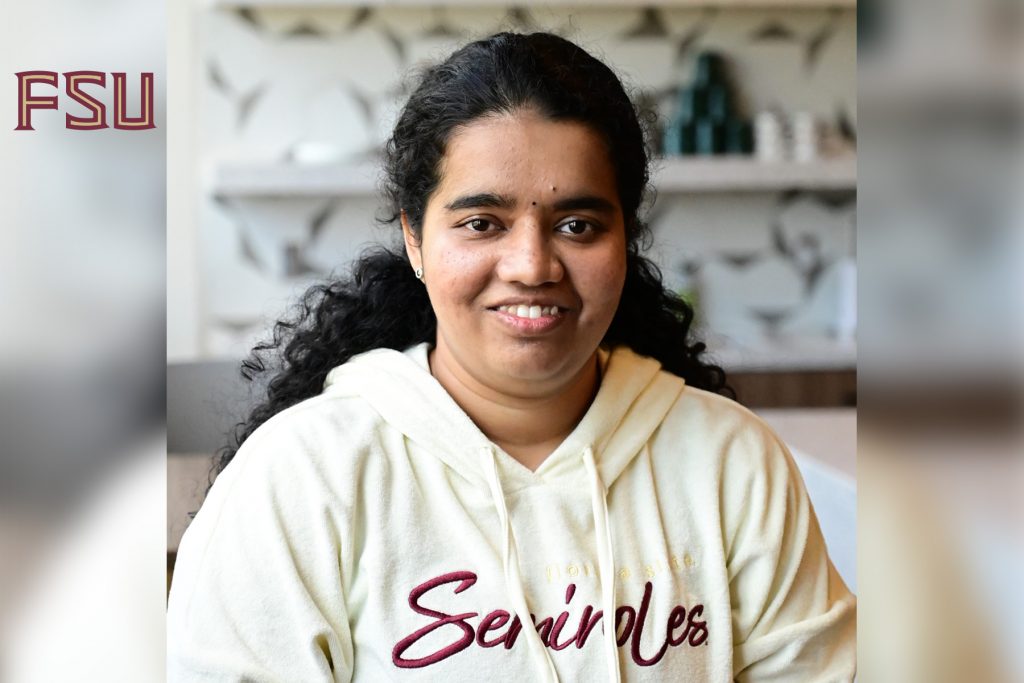Research to Impact: Highlighting the journey of one FSU graduate student through the National Science Foundation’s I-Corps program

Florida State University is translating academic research into commercial innovation and jumpstarting student success at the same time through a National Science Foundation program.
Nethraja Kandula, a doctoral student in the Department of Health, Nutrition, and Food Sciences, was part of a recent cohort of the National Science Foundation’s (NSF) I-Corps program, an immersive, entrepreneurial training program that facilitates the transformation of invention to impact for scientific researchers. I-Corps teams include a graduate student as the entrepreneurial lead, a technical lead with deep expertise in the technology area, and an industry mentor who provides business experience and is independent from the technical development of the technology.
Kandula led an I-Corps team focused on rapid foodborne pathogen detection methods in the lab of Prashant Singh, an associate professor at FSU who was the team’s technology lead.
Singh’s technology addresses a pressing safety concern in the food processing industry. Rapid testing methods are crucial for the food industry because experts and processors require quick and reliable assays. Animal processing within the food industry occurs at a rapid pace, so similarly speedy testing methods are necessary for safety. Kandula is a member of Singh’s lab and helped to create the testing method for pathogens most associated with poultry, such as salmonella.
After successfully inventing the test, the team contacted FSU Commercialization for next steps to bring their rapid detection method to market and were encouraged to participate in the NSF I-Corps program. Kandula and the team took part in the six-week regional I-Corps training program, which is divided into three sections: four weeks of direct, firsthand experience in customer discovery, one week of pitch preparation and one week to deliver a product pitch.
Kandula gained valuable experience working directly with business tools and theories: business canvas models, customer segmentations, hypothesis training, revenue streams, and customer relationships and channels.
“I’m really glad I learned more about customer discovery and how to ask the right questions to get the best information,” Kandula said. “As a scientist, this was all new to me. I-Corps showed us how to understand customers and gave us the tools for translating our research ideas.”
I-Corps training reduces the risk associated with translating technologies from the laboratory to the marketplace using experiential education for researchers. When starting the program, the team was primarily focused on targeting large poultry processors like Tyson or Cargill, but found large industries have their own testing labs. They uncovered a new target audience by learning that smaller processors do not have their own testing labs and send out their samples to third parties.
“That was a business ‘eureka’ moment for me — seeing where our technology could have the most impact,” Kandula said. “I-Corps bridges the gap between academia and business. It provides the tools to understand the full potential of an idea.”
Part of the I-Corps training is validating your idea, she said. Participants are given the ability to understand potential successes and quickly understand why an idea might not be successful. The program provides quick, rapid-fire feedback and valuable insight.
Having successfully completed the regional team program, Kandula and her team are applying for additional I-Corps training through the initiative’s seven-week program for national-level teams. This opportunity offers up to $50,000 in federal funding and deeper immersion into the ecosystem for evaluating the commercial potential of their technology.
“If you’re a student thinking about I-Corps — you should do it!” Kandula said. “Don’t overthink it. If you think you have a decent idea — not even a good one, just a decent idea — do it.”
Interested in I-Corps? For more information about I-Corps at FSU, contact FSU Commercialization.
The post Research to Impact: Highlighting the journey of one FSU graduate student through the National Science Foundation’s I-Corps program appeared first on Florida State University News.
Latest FSU News
- New Campaign Urges FSU Students to Keep Their Heads UpThe post New Campaign Urges FSU Students to Keep Their Heads Up appeared first on Florida State University News.
- Behind the Scenes: ACC Inventure PrizeThe post Behind the Scenes: ACC Inventure Prize appeared first on Florida State University News.
- Celebrating Gale Etschmaier’s legacy of innovation and service at Florida State University LibrariesAfter more than 30 years in academic library leadership, Gale Etschmaier will retire in June as dean of University Libraries […] The post Celebrating Gale Etschmaier’s legacy of innovation and service at Florida State University Libraries appeared first on Florida State University News.
- Jim Moran Institute for Global Entrepreneurship celebrates 30 years of empowering entrepreneurs30TH ANNIVERSARY PHOTO GALLERY The post Jim Moran Institute for Global Entrepreneurship celebrates 30 years of empowering entrepreneurs appeared first on Florida State University News.
- 30th anniversary celebration: Jim Moran Institute for Global EntrepreneurshipThe post 30th anniversary celebration: Jim Moran Institute for Global Entrepreneurship appeared first on Florida State University News.
- FSU meteorology student wins Hollings Scholarship to support work in atmospheric and environmental scienceA Florida State University Presidential Scholar has won a prestigious scholarship through the National Oceanic and Atmospheric Administration (NOAA) in […] The post FSU meteorology student wins Hollings Scholarship to support work in atmospheric and environmental science appeared first on Florida State University News.







